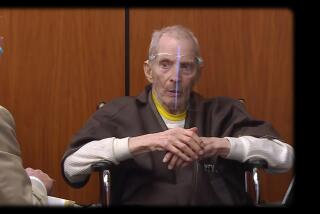A dog sitter and extra legroom. A look at the latest legal drama in Durst murder case

A dog and an airplane seat are the latest sticking points in the murder trial of Robert Durst. (June 14, 2017)Â (Sign up for our free video newsletter here http://bit.ly/2n6VKPR)
Who should pay for the retired detectiveâs dog sitter?
Thatâs the question at the heart of the latest squabble in the murder case of New York real estate scion Robert Durst â a legal battle between experienced prosecutors and a heavyweight defense team.
The back-and-forth, which is laid out in a recent court filing, focuses on what accommodations should be made for New York police Det. Michael Struk when he travels to Los Angeles this summer to testify for the defense.
Durst, 74, is accused of the execution-style shooting of his best friend, Susan Berman, in 2000 â a killing that prosecutors characterize as a move to silence her for what she knew about the 1982 disappearance of his first wife, Kathleen.
Struk, who led the investigation into Kathleenâs disappearance in the 1980s, is one of several witnesses expected to testify when Durst returns to court July 24.
But before making the trip from New Jersey, prosecutors said in court documents, Struk has a few requests, including boarding reimbursement for his two elderly dogs â one that needs daily insulin shots.
Records show that Struk got a quote from a veterinarian hospital â $191 a day â but suggested a cheaper solution: His daughter, who lives 50 miles away, could care for the dogs and house-sit for $100 a day.
Deputy Dist. Atty. John Lewin â who helped coordinate the travel logistics although the retired detective will testify for the other side â described the dog-sitting option, as well as Strukâs request for a business-class plane seat with extra legroom and for his wife to travel with him to California, as âreasonable and medically necessary for him and his pets.â
Durstâs attorney, Dick DeGuerin, disagrees.
In a letter to Lewin last week, which was attached to the filing, DeGuerin wrote, âWe decline to provide the type of luxurious amenities you provided to conditional witness Nick âChingaâ Chavin.â
Chavin, a New York advertising executive and longtime friend of Durst, delivered bombshell testimony against the real estate tycoon earlier in the year. Court documents said Chavin â whose identity was initially withheld from Durstâs lawyers â flew to Los Angeles more than two weeks before he testified and was under round-the-clock police protection by a team of 14. His wife came along.
DeGuerin referred in his letter to an article in Rolling Stone that said Chavinâs trip to Los Angeles included a first-class flight and excursions to the J. Paul Getty Museum and Griffith Observatory. Chavin was quoted as saying that his police escorts âknew the best restaurants.â Prosecutors said Chavin didnât fly first class, but rather business class â an accommodation necessary for his bad back.
Too heavy...bought axe. DID IT. Lift body parts into trash bags.
— An account prosecutors say Robert Durst wrote about disposing of a neighborâs body
Chavinâs wifeâs trip was paid for, prosecutors said, because it would not have made sense for her to remain in New York unprotected, while her husband was under protection. An L.A. Police Department detective submitted a declaration saying that Chavin was âneither wined nor dined,â and that he stayed at a hotel that cost $175 a night and got $64 a day for food. During his 18 days in Los Angeles, the detective wrote, âhe left his hotel no more than five times for reasons unrelated to his testimony.
In his letter, DeGuerin wrote that he understands the obligation to include reasonable transportation costs for witnesses but said anything beyond economy airfare, lodging and meal stipends for Struk âcould be interpreted as conferring a benefit on a witness.â
Durst isnât likely to stand trial until at least 2018, but the attorneys are calling several witnesses ahead of the trial to preserve their testimony.
Durstâs 2015 arrest in connection with Bermanâs slaying came a day before the finale of a six-part HBO documentary about Durst aired. During the last episode of âThe Jinx,â Durst mumbles, âWhat the hell did I do? Killed them all, of course.â
To many, his comments appeared to be a confession to three killings: those of his long-vanished wife, a neighbor in Texas and Berman. In the Texas case, Durst admitted to shooting his neighbor, Morris Black, saying he acted in self-defense during a struggle over a gun. He then chopped him up and dumped the parts in Galveston Bay. Durst was acquitted.
Prosecutors filed another motion this week, which included an attachment that Lewin described as a narrative Durst wrote while in custody in Galveston.
The document includes a timeline starting in the 1990s and an entry from 2000, when the author recalls getting a phone call from a family member alerting to the possibility of a reopened investigation into Kathleenâs disappearance.
âI feel numb,â the author wrote, before expressing shock and referring to it as a missing persons case. Still, the author was scared, and hatched a plan to live off the grid in Galveston.
âI knew,â the author wrote, âI would rather die than face possibility of jail!â
The narrative also has an entry for Sept. 28, 2001: âMorris removes gun from under yellow jacket, brief struggle, shot.â
The entry for the next day: âHow carry Morris out of apartment? Too heavy...bought axe. DID IT. Lift body parts into trash bags.â
For more news from the Los Angeles County courts, follow me on Twitter: @marisagerber
ALSO
More to Read
Sign up for Essential California
The most important California stories and recommendations in your inbox every morning.
You may occasionally receive promotional content from the Los Angeles Times.











